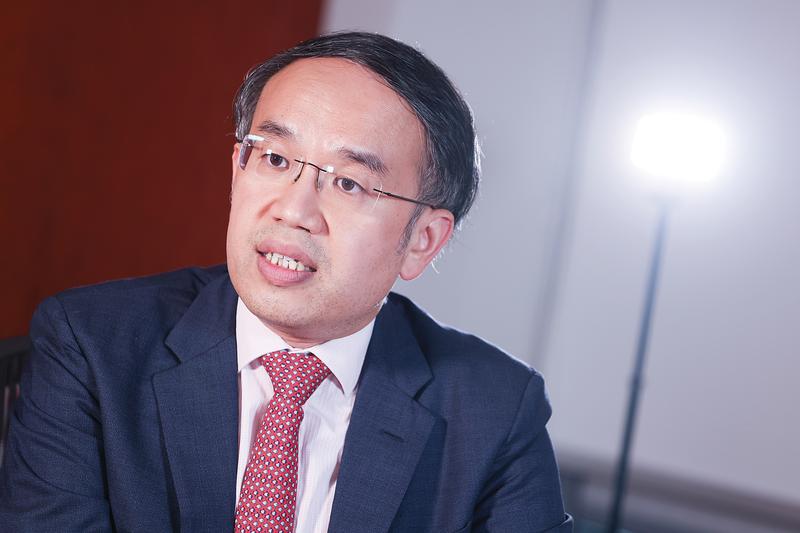Connecting to a brighter future

Financial connectivity between Hong Kong and the Chinese mainland is rising and becoming more sophisticated — from the cash and derivatives markets to the private-equity market. Hong Kong's secretary for financial services and the treasury talks to Oswald Chan.

Editor's note: This is the second part in a series of China Daily's interviews with the new heads of bureaus and other departments of the sixth-term administration of the Hong Kong Special Administrative Region. The heads discuss project plans, prospects and ways to address the city's current issues and challenges from their perspectives.
Connectivity between the capital markets of the Chinese mainland and the Hong Kong Special Administrative Region began in the cash market sector, with the gradual rollout of the Shanghai-Hong Kong Stock Connect, the Shenzhen-Hong Kong Stock Connect, the Mutual Recognition of Funds, Bond Connect, the Wealth Management Connect and the ETF Connect.
The mainland and the SAR have seen a breakthrough in cementing financial links, which have spread to the derivatives segment.
"Eventually, we are connected on the derivatives side with HKEX's launch of the MSCI China A 50 Connect Index Futures on our exchange for international investors to manage the price risk when investing in A shares," Christopher Hui Ching-yu, Hong Kong's secretary for financial services and the treasury, tells China Daily in an interview.
"We are also going to launch the Swap Connect, which is not about the price risk, but about the interest-rate risk for global investors in the mainland's interbank bond market to do swaps there. We can see that our connectivity with the mainland is not just increasing in number, but also gaining in sophistication in terms of the way we connect," he says.
More initiatives
Financial connectivity has now been extended into the private-equity realm.
Last week, the Financial Services and the Treasury Bureau of the HKSAR and the Authority of the Qianhai Shenzhen-Hong Kong Modern Service Industry Cooperation Zone in Shenzhen jointly promulgated 18 measures to support the linked development of Shenzhen and Hong Kong venture capital investments.
The new initiative in the cross-border, private-equity market is in line with Hong Kong's positioning in the Guangdong-Hong Kong-Macao Greater Bay Area and its aspiration to be the region's innovation and technology hub, says Hui. "Broadening the investment universe by making it available to our funds here is beneficial to Hong Kong. It also benefits the country in terms of bringing in capital for investment, especially, the technology sector."
He believes the latest measures will enable global private equity managers to take advantage of the mainland's private-equity landscape by sourcing investment opportunities, identifying investees in the country and, potentially, bringing in capital.
Another financial link the SAR and the mainland are considering is the Insurance Connect. The connect would allow cross-border sales of insurance products between Hong Kong and the mainland that would enable insurance financial institutions to do business across the Greater Bay Area region.
"The Insurance Connect is on our agenda in terms of how we can bring about greater connectivity between the two markets in the insurance sector," says Hui. "We have talked about this for quite some time. We look forward to realizing this potential and we are in close dialogue with the mainland authorities."
For the Insurance Connect, Hong Kong regulators have to discuss the issue with mainland regulators, as well as insurance industry stakeholders in the SAR, in such a way that the program can suit the needs of both stakeholders and policyholders, Hui adds.
In pursuing these capital market connectivity programs, the SAR has pledged to cement the ecosystem of the offshore renminbi financing business by providing more diversified investment products and building more sophisticated market infrastructures.
In terms of product diversification, enterprises can take advantage of the market situation and issue more renminbi-denominated bonds since interest rates in the United States are rising, while the renminbi interest rate is relatively low, says Hui. Hong Kong will facilitate bond issuances in the form of Panda or Dim Sum bonds.
The recently launched ETF Connect enables investors to conduct risk management as exchange-traded funds embody a number of stocks. "There is enormous potential in terms of using capital (renminbi) as a means for such diversification," says Hui. "In the broad context of renminbi internationalization, this will facilitate the ecosystem's enrichment and help those aiming for China exposure, be it in the form of equity or bonds."
Strategic measures
As for market infrastructure, Hong Kong is also gearing up to enhance the Central Moneymarkets Unit. "It is a settlement platform for bonds, but we plan to position it as Asia's primary securities depository. It is also a multi-currency platform with renminbi. With these improvements to make the CMU a primary securities depository, I am sure it will attract more bond issuances. This is conducive to a virtuous ecosystem in terms of bond market development."
Bolstering cross-border financial linkages and promoting renminbi internationalization is a proactive strategy to beef up Hong Kong's financial services industry. But the city also has to be on the defensive side. The HKSAR government is actively managing its fiscal reserves to bring long-term financial returns and strategic benefits to the local economy.
The city's financial secretary said in his 2020-21 budget that part of the Future Fund will be used to create the Hong Kong Growth Portfolio worth HK$22 billion ($2.8 billion) to make strategic investments in projects to boost returns, while reinforcing the city's status as a financial, commercial and innovation center and raising its productivity and competitiveness in the long run.
Regarding the growth portfolio, the government has appointed eight general partners so far to identify opportunities in the context of Hong Kong nexus companies. The government has increased the funding allocated to the Growth Portfolio under the Future Fund by HK$10 billion, of which HK$5 billion will be for setting up the Strategic Tech Fund, and the remaining HK$5 billion will be used to establish a GBA Investment Fund, focusing on investment opportunities in the Greater Bay Area.
Hui says the key trends of digitalization, decarbonization and decentralization will be the strategic investment themes so that the administration can use the money wisely.
"The industries we are pursuing, such as ESG (environmental, social and governance), artificial intelligence, advanced manufacturing and biotechnology, are in line with global technological development. More importantly, they are in line with our goal to be a technology hub in the world."
- Creative fireworks show held in China's 'fireworks capital'
- Chinese scientists achieve net-negative greenhouse gas emissions via electrified catalysis
- At the gateway to China's resistance, memories of war echo 88 years on
- Mainland scholar outlines 10 fallacies in Lai's separatist narrative
- China's first ocean-level smart scientific research vessel delivered in Shanghai
- World's first somatic cell-cloned dzo born in Xizang





































